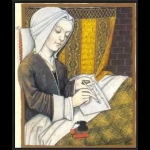As the dead prey upon us,
they are the dead in ourselves,
awake, my sleeping ones, I cry out to you,
disentangle the nets of being!
I pushed my car, it had been sitting so long unused.
I thought the tires looked as though they only needed air.
But suddenly the huge underbody was above me, and the rear tires
were masses of rubber and thread variously clinging together
as were the dead souls in the living room, gathered
about my mother, some of them taking care to pass
beneath the beam of the movie projector, some record
playing on the victrola, and all of them
desperate with the tawdriness of their life in hell
I turned to the young man on my right and asked, “How is it,
there?” And he begged me protestingly don’t ask, we are poor
poor. And the whole room was suddenly posters and presentations
of brake linings and other automotive accessories, cardboard
displays, the dead roaming from one to another
as bored back in life as they are in hell, poor and doomed
to mere equipments
my mother, as alive as ever she was, asleep
when I entered the house as I often found her in a rocker
under the lamp, and awaking, as I came up to her, as she ever had
I found out she returns to the house once a week, and with her
the throng of the unknown young who center on her as much in death
as other like suited and dressed people did in life
O the dead!
and the indian woman and I
enabled the blue deer
to walk
and the blue deer talked,
in the next room,
a Negro talk
it was like walking a jackass,
and its talk
was the pressing gabber of gammers
of old women
and we helped walk it around the room
because it was seeking socks
or shoes for its hooves
now that it was acquiring
human possibilities
In the five hindrances men and angels
stay caught in the net, in the immense nets
which spread out across each plane of being, the multiple nets
which hamper at each step of the ladders as the angels
and the demons
and men
go up and down
Walk the jackass
Hear the victrola
Let the automobile
be tucked into a corner of the white fence
when it is a white chair. Purity
is only an instant of being, the trammels
recur
In the five hindrances, perfection
is hidden
I shall get
to the place
10 minutes late.
It will be 20 minutes
of 9. And I don’t know,
without the car,
how I shall get there
O peace, my mother, I do not know
how differently I could have done
what I did or did not do.
That you are back each week
that you fall asleep
with your face to the right
that you are present there
when I come in as you were
when you were alive
that you are as solid, and your flesh
is as I knew it, that you have the company
I am used to your having
but o, that you all find it
such a cheapness!
o peace, mother, for the mammothness
of the comings and goings
of the ladders of life
The nets we are entangled in. Awake,
my soul, let the power into the last wrinkle
of being, let none of the threads and rubber of the tires
be left upon the earth. Let even your mother
go. Let there be only paradise
The desperateness is, that the instant
which is also paradise (paradise
is happiness) dissolves
into the next instant, and power
flows to meet the next occurrence
Is it any wonder
my mother comes back?
Do not that throng
rightly seek the room
where they might expect
happiness? They did not complain
of life, they obviously wanted
the movie, each other, merely to pass
among each other there,
where the real is, even to the display cards,
to be out of hell
The poverty
of hell
O souls, in life and in death,
make, even as you sleep, even in sleep
know what wind
even under the crankcase of the ugly automobile
lifts it away, clears the sodden weights of goods,
equipment, entertainment, the foods the Indian woman,
the filthy blue deer, the 4 by 3 foot ‘Viewbook,’
the heaviness of the old house, the stuffed inner room
lifts the sodden nets
and they disappear as ghosts do,
as spider webs, nothing
before the hand of man
The vent! You must have the vent,
or you shall die. Which means
never to die, the ghastliness
of going, and forever
coming back, returning
to the instants which were not lived
O mother, this I could not have done,
I could not have lived what you didn’t,
I am myself netted in my own being
I want to die. I want to make that instant, too,
perfect
O my soul, slip
the cog
II
The death in life (death itself)
is endless, eternity
is the false cause
The knot is other wise, each topological corner
presents itself, and no sword
cuts it, each knot is itself its fire
each knot of which the net is made
is for the hands to untake
the knot’s making. And touch alone
can turn the knot into its own flame
(o mother, if you had once touched me
o mother, if I had once touched you)
The car did not burn. Its underside
was not presented to me
a grotesque corpse. The old man
merely removed it as I looked up at it,
and put it in a corner of the picket fence
like was it my mother’s white dog?
or a child’s chair
The woman,
playing on the grass,
with her son (the woman next door)
was angry with me whatever it was
slipped across the playpen or whatever
she had out there on the grass
And I was quite flip in reply
that anyone who used plastic
had to expect things to skid
and break, that I couldn’t worry
that her son might have been hurt
by whatever it was I sent skidding
down on them.
It was just then I went into my house
and to my utter astonishment
found my mother sitting there
as she always had sat, as must she always
forever sit there her head lolling
into sleep? Awake, awake my mother
what wind will lift you too
forever from the tawdriness,
make you rich as all those souls
crave crave crave
to be rich?
They are right. We must have
what we want. We cannot afford
not to. We have only one course:
the nets which entangle us are flames
O souls, burn
alive, burn now
that you may forever
have peace, have
what you crave
O souls,
go into everything,
let not one knot pass
through your fingers
let not any they tell you
you must sleep as the net
comes through your authentic hands
What passes
is what is, what shall be, what has
been, what hell and heaven is
is earth to be rent, to shoot you
through the screen of flame which each knot
hides as all knots are a wall ready
to be shot open by you
the nets of being
are only eternal if you sleep as your hands
ought to be busy. Method, method
I too call on you to come
to the aid of all men, to women most
who know most, to woman to tell
men to awake. Awake, men,
awake
I ask my mother
to sleep. I ask her
to stay in the chair.
My chair
is in the corner of the fence.
She sits by the fireplace made of paving stones. The blue deer
need not trouble either of us.
And if she sits in happiness the souls
who trouble her and me
will also rest. The automobile
has been hauled away.



















Comment form: